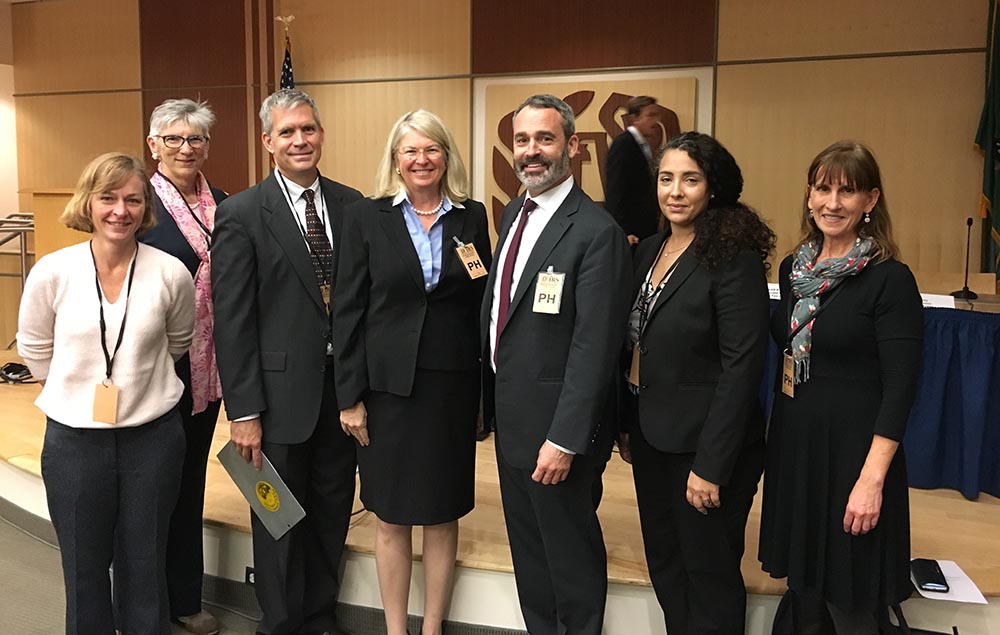 Left to right: Executive Director of Virginia United Land Trusts Ellen Shepard, Virginia United Land Trusts Chair Peggy Stevens, PEC Field Representative Rex Linville, Virginia Outdoors Foundation Chair Eleanor Weston Brown, Land Trust Alliance President of Andrew Bowman, Virginia Outdoors Foundation Executive Director Brett Glymph and Land Trust Alliance Government Relations Director Lori Faeth. Photo Courtesy of Lori Faeth, Land Trust Alliance
Left to right: Executive Director of Virginia United Land Trusts Ellen Shepard, Virginia United Land Trusts Chair Peggy Stevens, PEC Field Representative Rex Linville, Virginia Outdoors Foundation Chair Eleanor Weston Brown, Land Trust Alliance President of Andrew Bowman, Virginia Outdoors Foundation Executive Director Brett Glymph and Land Trust Alliance Government Relations Director Lori Faeth. Photo Courtesy of Lori Faeth, Land Trust Alliance
My job with The Piedmont Environmental Council usually has me visiting farms and forests in Albemarle and Greene counties and advising landowners on conservation strategies for their property. But early this November, I found myself on Constitution Avenue in Washington, D.C. offering public comment to the IRS about proposed regulations that would adversely impact land conservation in Virginia.
Virginia has been a national conservation leader for almost 20 years, in large part due to a Land Preservation Tax Credit the General Assembly established in 1999. The Virginia tax credit program was set up to work alongside and in concert with the federal income tax deduction that landowners receive when they protect land through a conservation donation. Unfortunately, Virginia’s conservation tax credit program has gotten caught up in a regulation proposed by the IRS that is designed to stop a scheme in which some states have set up “charitable funds” to help people avoid a new $10,000 cap on the federal income tax deduction for State and Local Tax payments.
Since this is such an important issue here in Virginia, PEC wanted to make sure we did everything we could to ensure conservation contributions were excluded from the proposed IRS rule. One of our first stops was to visit with staff for Senators Kaine and Warner to alert them of the problem and ask for their help. We also hired one of the nation’s best conservation tax attorneys to help draft an analysis and response to the proposed regulation. Finally, we reached out to coordinate our activities with land conservation colleagues in states with similar tax credit programs, and we asked the national Land Trust Alliance to weigh in on the issue as well.
As a result of this advocacy, over 100 conservation organizations from across the nation provided written comment to the IRS about the impact the proposed regulation would have on land conservation in their communities. At the public hearing in Washington this November, there were also speakers from the Land Trust Alliance and the Virginia Outdoors Foundation.
We still don’t know what the IRS will ultimately decide or even when they will finalize the proposed regulations. But for now, I feel confident that we have done everything we could to try to influence the outcome of this decision. I also feel privileged to work for an organization that is uniquely situated to work one on one with landowners at the local level and, at the same time, tackle regulatory rule making at the national level. Incentives like these matter to landowners who are considering the permanent protection of their land. In order to be effective, we need to work at the local, state and national level to ensure that the right system of incentives and policies is in place to help encourage protection of our natural resources.
Rex Linville is a land conservation field representative with PEC serving Albemarle and Greene counties. Rex has been working with landowners on conservation easements for the past 20 years. He holds a B.S. in Finance from Virginia Tech and an M.S. in Forest Sciences from Colorado State University.
This article was featured in our Winter 2018 member newsletter, The Piedmont View.
